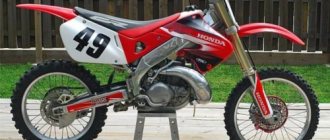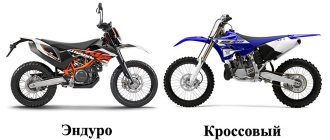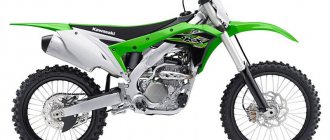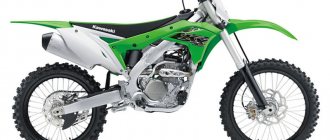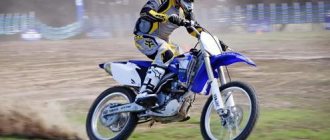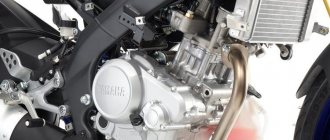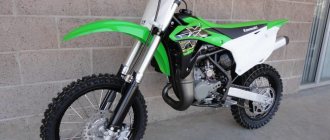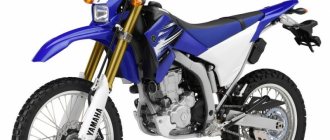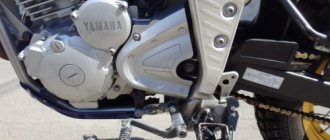| Yamaha WR450F (2003-2004) | Yamaha WR450F (2005-2006) | Yamaha WR450F (2007-2011) |
| Yamaha WR450F (2012-2015) | Yamaha WR450F (2016-2018) | Yamaha WR450F (2019-2020) |
| Yamaha WR450F (2021+) |
Yamaha WR450F hard enduro model
was introduced to the market at the end of 2002 (2003 model year), replacing the Yamaha WR426F. The motorcycle was built on the basis of the motocross version of the Yamaha YZ450F, differing from it in the presence of lighting equipment, engine settings (less forced, increased torque at low and medium speeds), suspension and chassis geometry. Unlike its predecessor (WR426F), the new WR450F received an electric starter.
In 2005, the model receives a new exhaust system.
In 2007, the Yamaha WR 450 underwent a major restyling, receiving an aluminum frame, a new plastic design and headlights, as well as a new generation of engine - a new balancer, camshafts, and a modified cylinder head.
Since 2012, Yamaha has introduced a new generation of the WR450F. The updated model received electronic fuel injection (instead of a carburetor), a digital transistor ignition system, a new KYB SSS (Speed-Sensitive System) front fork and a modified engine position (the engine was turned back, which slightly shifted the center of gravity and improved handling characteristics).
2016 was marked by the next generation of the Yamaha WR450F. The model received a new engine with a 4-valve cylinder head (instead of a 5-valve), the suspension characteristics changed, and the diameter of the front brake disc was increased from 250 to 270 mm.
In 2021, the model receives a slightly modified headlight design, a new engine with an increased compression ratio (12.8 versus 12.5), increased fuel tank capacity (8.3 versus 7.6 liters), and slightly modified chassis geometry.
For 2021, Yamaha is updating the WR450F. The model received a new engine cylinder head, increasing the compression ratio to 13.0, a revised frame and optimized suspension settings. The motorcycle also began to be equipped with a different LCD instrument panel and received an update to the front brake (new caliper, stiffer pads).
The main competitors of the Yamaha WR450F in the class
:
- Honda CRF450F
- Kawasaki KLX450/KX450X
- Suzuki RMX450Z
For whom
Here are the main advantages of the Yamaha WR 450:
- high power and torque;
- comfortable fit, allowing you not to get tired for a long time;
- nice and catchy design of a classic enduro.
The motorcycle is not suitable for beginners; its engine is too large. However, an experienced off-road enthusiast will immediately recognize the Yamaha WR 450 as an excellent specimen suitable for off-road racing. Yes, this motorcycle is far from the most passable, but it is a solid average in its class and does not even think of being inferior to many more modern models.
Brief history of the model
- 2003 - start of production and sales. First generation.
Model
: Yamaha WR450F (all markets).
Factory designation
: WR450FR (USA), 5TJ1, 5TJ2, 5TJ4.
- 2004 - no significant changes.
Model
: Yamaha WR450F (all markets).
Factory designation
: WR450FS (USA), 5TJ5, 5TJ6, 5TJ7.
- 2005 - the model receives a new exhaust system.
Model
: Yamaha WR450F (all markets).
Factory designation
: WR450FT (USA), 5TJ8, 5TJ9, 5TJA.
- 2006 - no significant changes.
Model
: Yamaha WR450F (all markets).
Factory designation
: WR450FV (USA), 5TJB, 5TJC, 5TJD.
- 2007 - restyling of the model. Second generation
.
Model
: Yamaha WR450F (all markets).
Factory designation
: WR450FW (USA), 5TJE, 5TJF, 5TJG.
- 2008 - no significant changes.
Model
: Yamaha WR450F (Europe, North America).
Factory designation
: WR450FX (USA), 5TJK, 5TJL, 5TJM.
- 2009 - no significant changes.
Model
: Yamaha WR450F (all markets).
Factory designation
: WR450FY (USA), 5TJP, 5TJR, 5TJS.
- 2010 - no significant changes.
Model
: Yamaha WR450F (Europe).
Factory designation
: 5TJU, 5TJV.
- 2011 - no significant changes.
Model
: Yamaha WR450F (Europe, North America, Australia).
Factory designation
: WR450FA (USA), 1HB2, 1HB3.
- 2012 - restyling of the model. Third generation
.
Model
: Yamaha WR450F (Europe, North America, Australia).
Factory designation
: WR450FB (USA), 1DX1, 1DX4.
- 2013 - no significant changes.
Model
: Yamaha WR450F (Europe, North America, Japan).
Factory designation
: WR450FD (USA), 1DX5, 1DX6, 1DX9.
- 2014 - no significant changes.
Model
: Yamaha WR450F (Europe, North America, Japan).
Factory designation
: WR450FE (USA), 1DXA, 1DXD.
- 2015 - no significant changes.
Model
: Yamaha WR450F (Europe, North America, Australia).
Factory designation
: WR450FF (USA), 1DXF, 1DXJ.
- 2016 - restyling of the model. Fourth generation
.
Model
: Yamaha WR450F (Europe, North America, Australia).
Factory designation
: WR450FG (USA), 2GC1, 2GC2, 2GC3.
- 2017 - no significant changes.
Model
: Yamaha WR450F (Europe, North America, Australia).
Factory designation
: WR450FH (USA), 2GC6, 2GC7, 2GC8.
- 2018 - no significant changes.
Model
: Yamaha WR450F (Europe, North America, Australia).
Factory designation
: WR450FJ (USA), 2GCA, 2GCB, 2GCC.
- 2019 - restyling of the model. Fifth generation
.
Model
: Yamaha WR450F (Europe, North America, Australia).
Factory designation
: WR450FK (USA).
- 2020 - no significant changes.
Model
: Yamaha WR450F (Europe, North America, Australia).
- 2021 - restyling of the model. Sixth generation
.
Model
: Yamaha WR450F (Europe, North America, Australia).
- 2022 - no significant changes.
Model
: Yamaha WR450F (Europe, North America, Australia).
Dimensions and weight
The length of the WR 450 reaches 2315 mm, its width is 825 mm, and its height is 1275 mm. The wheelbase dimensions are 1475 mm, and the seat height is 960 mm. The curb weight of this bike is 122 kg and the tank capacity is 7.2 liters. Taking into account the average gasoline consumption of 6 liters per hundred kilometers, this is quite enough.
Hi all! I once wrote about how I tried to fix my bike (https://bikepost.ru/blog/32954/Podgotovka-k-sezonu-2013-WR450F.html#cut). To be honest, I did not expect interest and requests to write about him.
For those interested, welcome to cat. Actually a little history.
My first motorcycle was a 1993 Honda XR600R. I knew what I was buying. I needed a motorcycle suitable not only for traveling on dirt, but also for long-distance travel. Actually, the XR600R is a good tractor. He made me happy. Here it is, actually, a month after purchase. Anything has happened to me and the motorcycle. This also happened , but this is not about him. After I realized that a big ship needs a big torpedo for a long voyage and “Let the shoemaker make the boots, and let the cake maker bake the pies :)”, then I decided to change my bike to a sharper, faster and more daring one, and leave long journeys for, for example XT660Z or XT1200Z Tenere. Since all my friends, as one, chose the WR450F, the question of choice disappeared by itself.
I knew what I was buying. I needed a motorcycle suitable not only for traveling on dirt, but also for long-distance travel. Actually, the XR600R is a good tractor. He made me happy. Here it is, actually, a month after purchase. Anything has happened to me and the motorcycle. This also happened , but this is not about him. After I realized that a big ship needs a big torpedo for a long voyage and “Let the shoemaker make the boots, and let the cake maker bake the pies :)”, then I decided to change my bike to a sharper, faster and more daring one, and leave long journeys for, for example XT660Z or XT1200Z Tenere. Since all my friends, as one, chose the WR450F, the question of choice disappeared by itself.
And now, I am the proud owner of WR. We managed to get a good copy with a range of 1,700 km, purchased from an official dealer. The scenario of the previous operation was as follows: I drove out 3 times, fell 2 times, well, screw it (this is a common thing here). This made me very happy, because... in fact, for an adequate amount (RUB 210,000), I got an almost new motorbike with a little tuning. The lack of PTS doesn't bother me one bit. I was aware of the inherent problems with this motorcycle long before purchasing it. 1. Pump seal leakage is a common occurrence. If you do not have this problem, then this means that either the motor is new or has just been serviced in this direction. There is even a video on this topic on YouTube: www.youtube.com/watch?feature=player_embedded&v=vZMiiO4RCiQ 2. This is purely subjective: weak wheel bearings. I came across this when I was just going to the Valley of Extinct Volcanoes for a week without much extreme sports. When replacing the bearings, the latter did not spin at all. For the sake of fairness, it is worth saying that the bearings were purchased from us in Avtograd, that is, they were actually selected. Now there are OEM bearings and there is a spare set in the drawer.
There are some maintenance features for this motorcycle: For example, I change the oil strictly every 1000 km. Every 2000 km. oil filter. The life of the chain and sprockets depends on how you unscrew the handle. This is not a Hayabusa, of course, but it also eats up consumables quite well. I check the valves every 5000 km. In fact, I recently took the motorcycle to a professional service to clean and adjust the carburetor, regularly check the valves and other important components. By the way, the pump shaft is also an element that requires attention! So, when a couple of days ago the guys disassembled the pump to replace the pump shaft bearing and 2 seals, serious wear was discovered on the pump. This is despite the fact that the shaft is made of hardened steel. This is a serious flaw in the WR450F in my opinion. So, on the Yamaha RXW10 mountain snowmobile there is a special membrane on the pump shaft that stupidly prevents the coolant from going anywhere, but here... in short, the unit is unreliable in my opinion. This is despite the fact that installing a membrane does not entail a serious weight gain.
In addition, I want to draw attention to 1 element: the carburetor. Keihin FCR is a very good carb with an accelerator pump. However, in order to remove it, you need to dismantle the subframe, unscrew the upper shock absorber mount and only then remove it. From a maintenance point of view, this is an unrealistic hemorrhoid. The Honda CRF 450 motorcycle is much easier to maintain from this point: there is a hole at the top of the frame, and the shock absorber mount is lower. When I went to the guys’ service yesterday, the shock absorber was completely taken out “Blah, who came up with such a fucking design???!!!
Keihin FCR is a very good carb with an accelerator pump. However, in order to remove it, you need to dismantle the subframe, unscrew the upper shock absorber mount and only then remove it. From a maintenance point of view, this is an unrealistic hemorrhoid. The Honda CRF 450 motorcycle is much easier to maintain from this point: there is a hole at the top of the frame, and the shock absorber mount is lower. When I went to the guys’ service yesterday, the shock absorber was completely taken out “Blah, who came up with such a fucking design???!!! On a Honda it’s done in no time!!!!” they said.
On a Honda it’s done in no time!!!!” they said.
You should be very careful about the level of oil being poured. This is strictly 1 liter! When filling one and a half liters of my colleagues in the shop (“For safety,” they said), some kind of oil seal was squeezed out. To be honest, I don’t remember which one
To be honest, I don’t remember which one
Actually, there's not much more to say about the service. Tuning: installed Trail Tech Vapor. The thing is necessary. The previous owner installed forced cooling. There is a fan on the radiator, which is powered directly from the battery, and there is a toggle switch on the steering wheel. I personally have never broken down or overheated. Even when I got the reins under my tail to make a supermotard out of it (that’s a whole different story). I also removed the flute from the muffler. The sound became angrier. I decided not to change the exhaust, because... this entails the need to re-adjust the carburetor and, ideally, a DYNO stand, which we don’t have for motorcycles (let me remind you, I live in Irkutsk).
Tuning: installed Trail Tech Vapor. The thing is necessary. The previous owner installed forced cooling. There is a fan on the radiator, which is powered directly from the battery, and there is a toggle switch on the steering wheel. I personally have never broken down or overheated. Even when I got the reins under my tail to make a supermotard out of it (that’s a whole different story). I also removed the flute from the muffler. The sound became angrier. I decided not to change the exhaust, because... this entails the need to re-adjust the carburetor and, ideally, a DYNO stand, which we don’t have for motorcycles (let me remind you, I live in Irkutsk).
Impressions: What can you say?? Wheelbarrow fire! Not beaten, not painted!!! It undermines to the fullest even in the stock version... All the service features are easily compensated by the emotions that I get from the bike! They are simply amazing! Light (especially after the XR600R), explosive, fast!
I think the photos at the end of the post will add fuel to the fire! Competitors? At the time of purchase there was only CRF. But I decided not to bother bothering myself. Today there are plenty of competitors! This includes KTM, Husaberg, Suzuki RMX450Z, Husqvarna, and Kawasaki! I think the choice comes down to nuances.
Competitors? At the time of purchase there was only CRF. But I decided not to bother bothering myself. Today there are plenty of competitors! This includes KTM, Husaberg, Suzuki RMX450Z, Husqvarna, and Kawasaki! I think the choice comes down to nuances.
I assume that my next bike will be either a WR450F but a new one from 2013. with injection, or Husaberg FE350.
PS For real road racing, I have a 2001 Yamaha FJR 1300. After implementing his long-standing idea (from Moscow to Irkutsk along the Golden Ring and through other large cities of the Russian Federation), this year it will be sold and a heavy enduro will be taken instead, because the beauty of wild nature and the joy of contemplating them are useless when there is no one to share them with... I want, together with my future wife, to enjoy the sunset in the mountains, mountain rivers, lakes and wake up in the morning not in a roadside hotel, but in a tent on the shore of Lake Baikal.
Thank you very much to everyone who completed the post!!!
Photos and bonus track!
Stuck it in the mud :))
Ready for hardcore!!! The trunk is a Giantloop Coyote.
The trunk is a Giantloop Coyote.
This is Yaskin Dmitry. The man who raised and organized teaching children to effectively ride a motorcycle and continues to do so productively! A month after our joint (the three of us) trip to the Valley of Extinct Volcanoes, he brought the children there and successfully traveled with them almost the entire valley!
BONUS TRACK:
Installing a fender extension on a Yamaha FJR 1300.
So, let's remove the wing!
Let's launder! We apply Poxipol (I was afraid to use 2-sided tape... even from 3M). We take the fender liner. We glue this thing together and press it together with clamps. And we put the wing in place and drive in the summer with a pretentious face showing off the CARBONIA fender liner 
Chassis and brakes
The WR 450 has an aluminum frame, which is equipped with a double-sided beam. The wheels here, of course, are spoked, as expected according to the canons of the class. The steering wheel is typical. The appearance of the model strongly resembles a cross-country motorcycle, however, an experienced biker will immediately understand that this is an enduro.
As for the suspension, there is a monoshock absorber at the rear and an inverted fork at the front. The rear brake features a single-piston caliper and 245mm disc, while the front brake features a dual-piston caliper and a 250mm disc. These are quite good chassis characteristics for the enduro class.
Reviews
Yamaha WR450F reviews:
Expand Collapse
As the owner of this unit (WR450F '08), I can highlight some points:
Pros:
+ powerful motor, especially at medium and high speeds - constantly provokes you to unscrew the handle and put the rear wheel into the axle box or pass an obstacle at speed;
+ excellent suspension and handling - thanks to a wide range of settings, you can adjust the fork and shock for both off-road travel and hard riding in the pampas with a visit to the cross-country track; + comfortable geometry and seating position: the steering wheel (albeit bent ;D) thanks to spacers is high (does not tire you when driving for a long time while standing), the seat is narrow (you can squeeze it well with your knees), comfortable wide footrests, high ground clearance (you can easily storm logs, tires, curbs ); + quick access to the air filter - no need to remove the seat and plastic - turn the clamp, open the door and you're done; + good headlight and tail light (no fear of returning home from a ride in the dark); + electric starter (although it’s good to start with a kick, but in the heat after falling and filling the carb, you can die without a button); + excellent plastic and protection for everything that breaks during falls (radiator protection is additionally installed ;)); + appearance - I just LOVE it
Cons:
— due to the high engine height at low speeds/rpm, there is insufficient maneuverability in narrow places;
— it’s hard to find “neutral”; - it is impossible to start a stalled engine in gear with the clutch depressed (although this is only on my VR - I don’t know why) - high fuel consumption (not lower than 95 super) - about 7.5 l/100 km in off-road and 6 l/100 km on the road; — it’s eating oil — you need to add about 100 g/100 km (maybe it’s time to change the rings — I’m reassuring myself ::)); — noisy engine (compared to civilian motorcycles); — frequent maintenance + opening the engine once a season; — inability to travel (short range (tank 8 liters for 100-120 km), the seat is narrow and hard, there is no trunk and there is nowhere to attach it, there are no passenger footrests)
BUT, the drive that this fan car gives overshadows all the disadvantages and inconveniences so that you don’t even remember about them.
I rode the WR450F 2007 for the summer... The engine is quite powerful (but for some reason it starts to twitch at high speeds and when the gas is sharply opened...), the suspension is soft (they break through) and the engine is very heavy.
I rode the WR for 3 seasons and realized that its brutal engine and hard suspensions make you the same beast, it’s cool of course, but sometimes you just want to ride and throw mud through the woods, so after selling it I bought a Kavu 250. The soft suspensions of the engine are not a recreational rocket the very best)) Although in truth I wanted to have sportenduro in my arsenal so as not to lose shape!))
Controllability
Another plus of the new fork is the new lugs. They feature a 22mm axle for a crisper steering feel. By the way, the same axle has been installed on the YZ450F since 2014. Further, the new speedometer uses an inductive sensor, thereby ridding the motorcycle of a cable drive. The new, compact headlight fairing is slightly lower and closer to the fork, making the handlebars a little lighter. The new model also has brake lines laid differently. A LED taillight is tucked comfortably under the rear fender. True, this is precisely a flashlight, and not a brake light, which this model still does not have.
Thanks to the motorcycle's unique reverse head design, the air filter housing is located at the front and the fuel tank is located under the seat. This provides a number of advantages for an enduro motorcycle, which often has a fairly large tank. Here, the 8.3-liter tank fits entirely under the seat, without protruding in any way in the rider’s seating area, and thanks to its rather low location, the amount of gasoline does not affect handling.
Yamaha WR450F engine protection
The new engine guard now better protects the coolant pump and radiator hoses. It also adheres better to the frame, helping to reduce dirt buildup between the engine and guard. Of course, the new model comes with everything you'd expect from an enduro bike: an 18-inch rear wheel, a sealed chain, a steel rear sprocket, a side stand and a mechanical muffler with spark arrestor.
Ergonomics and controls are a Yamaha signature. The brakes are powerful and progressive, the clutch is reliable. Dunlop MX3S tires perform well, but are short-lived (and this is normal for enduro).
Yamaha WR450F suspension
The previous Yamaha WR450F chassis was good, but different from the YZ450F motocross. In 2021, the WR has become closer to a motocross model, receiving all the same features and chassis functions. In addition, the Yamaha WR450F has a KYB Speed Sensitive System fork with a coil spring and a KYB monoshock, the same as on the YZ450F. The only difference is in the settings of the valves and springs for the specifics of enduro riding.
The Yamaha WR450F suspension adapts through certain settings to suit a wide range of rider skills and sizes. Although it seemed to me that it was a little soft, I can’t complain about constant breakdowns. At low speeds and on rocky sections, the fork performs well, giving clear feedback without yaw when hitting obstacles.
Flaws
It’s interesting that the shortcomings are expressed mainly by those who, having seen the Enduro—a similar suspension, expect to see the Enduro—similar characteristics.
The disadvantages include the unpresentable appearance (open) and the lack of light signals. “ You can’t get past the traffic police officer; he’ll stop you because he’s not there .”
Yamaxa YZ450F is a motorcycle that is clearly not suitable for riding on public roads.
Comments are unnecessary - any external body kit is an additional mass, not always correctly centered.
This also includes the need for frequent maintenance:
- The oil filter must be changed after every long ride;
- fuel of strictly one brand (up to one gas station);
- The piston engine lasts no more than 100 km in Enduro mode.
and dignity
An interesting feature of the latest modification of the motorcycle is Wi-Fi support for tuning and diagnosing the engine.
One of the major advantages of the model is the YZ system, although in some cases it needs to be purchased separately. Among its features:
- power change;
- adjusting the fuel mixture (enrich/lean);
- adjusting the correspondence of speeds and revolutions;
- When connecting additional cards, you can change the parameters of any motorcycle harness.
The advantages include a good ratio between weight and suspension, economical consumption, and fast acceleration.
So who is whose successor?
In general, the Yamaxa YZ450F is a fairly popular “cross bike”, about which motorcycle racers speak mostly positively.
The yz426f version, which was mentioned at first, was produced until 2002. Since the new 2003, it received new components, a different fuel supply system for the engine and turned... into the YZ450F, the production of which continues. During production, the model underwent two restylings - 2006 and 2010.
But 426 itself is a successor. Until 200, it bore the name... yz400f. Having an engine capacity of 400 cm3 and a carburetor fuel supply system.

